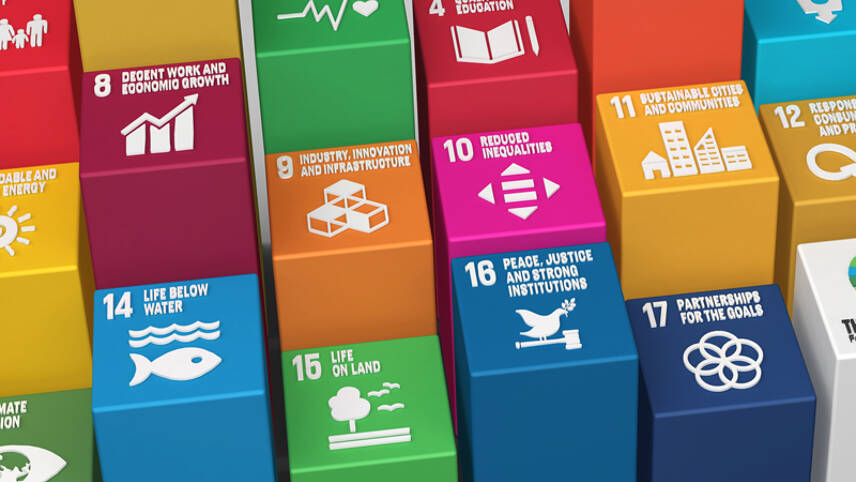Register for free and continue reading
Join our growing army of changemakers and get unlimited access to our premium content

The Goals cover 2015 to 2030, but, by some estimates, won't be fully delivered until the 2090s
Comissioned by standards developer and business improvement services firm BSI, the survey polled deicion-makers more than 1,000 UK-based SMEs across a range of sectors. Just 18% said they are aware of the SDGs, despite the framework having been launched in 2015 and with less than eight years now left to achieve its ambitions to time.
BSI also found that some half of decision-makers at large British businesses do not know what the SDGs are. BSI classes a large business as one with 250 or more employees.
Across businesses of all sizes, SDG-related awareness was found to be highest in the manufacturing sector. High levels of awareness were also recorded in the medical sector, IT and telecoms. At the other end of the scale, awareness was lowest in hospitality and leisure, education, media, communications and sales.
The SDGs have been described as a global to-do list for the delivery of a future in which many of the planet’s biggest environmental, social and economic challenges have either been eradicated or are being addressed at scale. Environmental topics covered include reducing emissions, conserving and restoring land-based and water-based ecosystems, cutting pollution, combatting food waste and curbing the overconsumption of natural resources.
BSI’s findings could, as a standalone, indicate that businesses are using different frameworks to design and implement their environmental and social strategies. Yet the survey also found that 40% of organisations have no established sustainability goals with time-bound, numerical targets.
“It is imperative that businesses of every nature and size understand the importance of sustainability in their operating model if they are going to survive into the future,” said BSI Assurance’s global head of sustainability solutions Murray Sayce. “This data… indicates a massive knowledge and implementation gap that needs to be filled.”
To Sayce’s latter point, BSI believes that the issue lies not with businesses not wanting to do the right thing for people and the planet, but due to a lack of understanding of how to set and deliver credible targets.
On waste specifically, a separate piece of research from waste management firm Biffa, which polled 1,004 UK SMEs, found that just 47% recycle any of their waste. This is despite six in ten claiming that environmental sustainability is “very important” to their business. Firms without recycling service contracts cited prohibitive costs, a lack of knowledge and thinking that they don’t have enough room for bins on their premises as barriers to action.
Policy impact?
The BSI and Biffa surveys have been published shortly after an academic article published in the journal Nature Sustainability, assessing the political impact of the SDGs, concluded that “nothing has changed where it matters”.
The researchers behind the article found “little evidence” of governments changing policy and legislation to deliver the vision laid out by the SDGs, despite more references to SDGs by policymakers and business leaders. The article concludes that reforms in national and sub-national governments and UN agencies have been “modest” at best since 2015.
The leader of this research, Utrecht University’s professor of global sustainability governance Frank Biermann, said: “That governments and corporations talk differently about sustainability and refer to the SDGs more often today can be seen as a sign of hope that this talk will be followed by action. And yet, mere talk can backfire by conferring legitimacy on unsustainable behaviour, letting corporate leaders wave colourful SDG flags while prizing profits above all else. Simply talking about SDGs can demobilise civil society by creating a false impression of action.”
The article does not argue in favour of simply scrapping the SDGs. Instead, it recommends that supporting organisations properly change their governance and increase their ambitions, joining up actions to achieve contributions to multiple SDGs. It also concludes that there is more work to be done to include civil society in the delivery of the SDGs and to provide consumers and other key stakeholders with more detailed information on progress against commitments.
edie is planning a dedicated focus week of themed events and content on the UN SDGs this September. Keep in the loop with our email newsletters for more information as and when it becomes available.


SDGs are important – they even inspired the name of our company (Climate 17).
The difficulty is lack of agreement on prioritization. To effectively tackle such a wide variety of issues with limited resources, there needs to be a way to achieve a consensus about where to allocate those resources best and when. There have been just a few people proposing such methodology. Every one of those goals is important, so whenever another goal is put above it, organisations that have a mission focused on it can see it as being overlooked. Once a framework on how to prioritize resources, including government spending and incentives is reached, then the whole process will achieve results quicker.